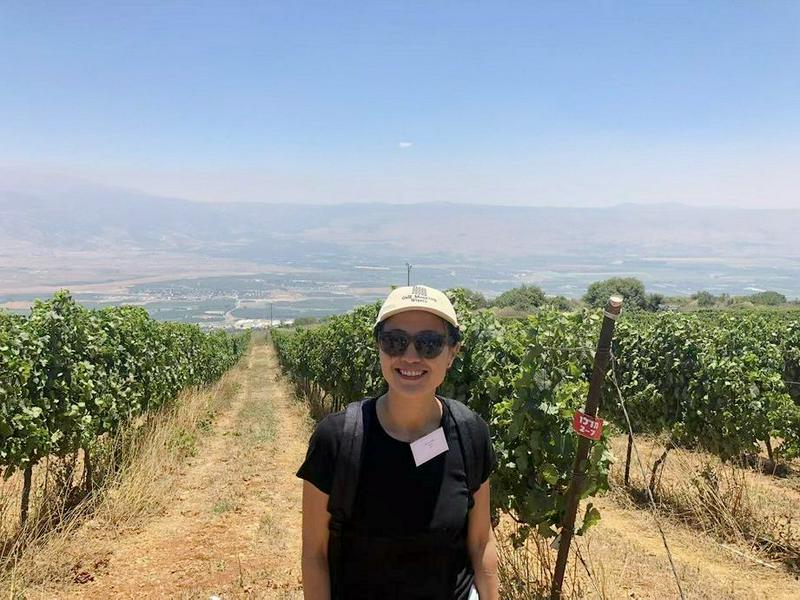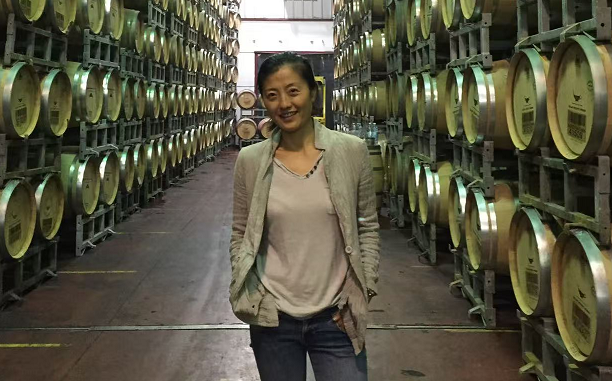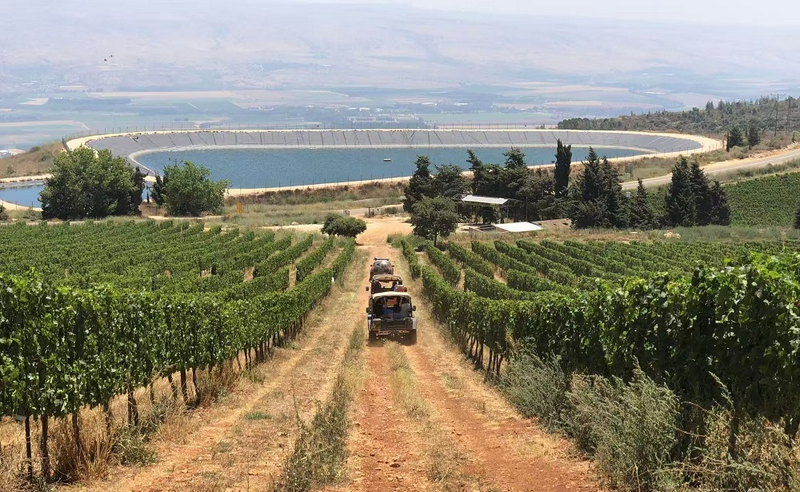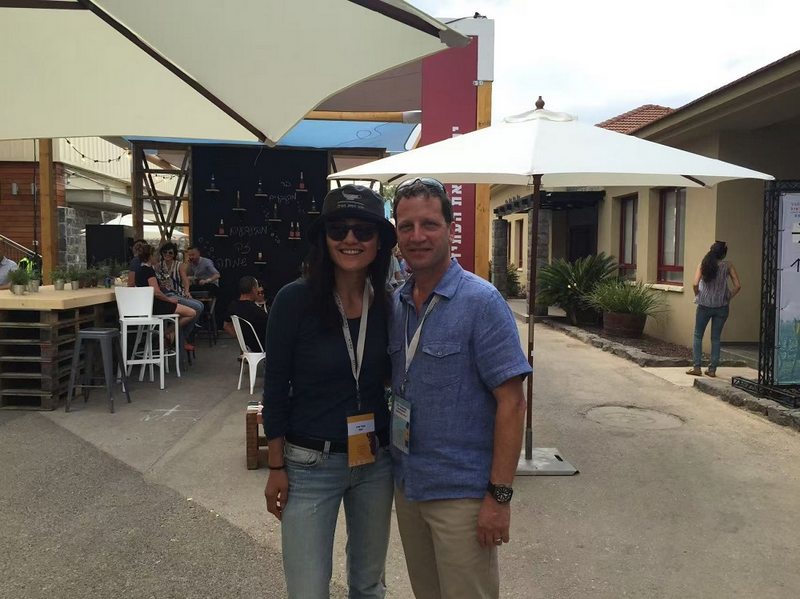Modern-day Israel was once known as the "Land of Canaan", referred to in the Bible as "a land flowing with milk and honey." One of the most impressive allusions associated with the Jewish people's connection to this land is a bunch of grapes:
After the ancient Jews left Egypt, Moses sent 12 spies to the land of Canaan to see how it was faring. Among them, two were astonished by the land's abundance. In order to prove it, the two men brought back a bunch of grapes, along with pomegranates and figs. The bunch of grapes was so large that it had to be carried back by two men on a pole (Numbers 13:23).
Over four thousand years later, grapes are still among Israel's finest agricultural products, and the wines made from them have become a symbol of Israel's cultural identity on the international stage.
The Israeli Ministry of Economy and Industry places special emphasis on promoting its wines, hoping that more Chinese people will come to appreciate them. At a New Year event held earlier this year, themed "A Taste of Fine Israeli Wine," organized by the Economy & Trade Department of the Consulate General in Shanghai, the host introduced: "The exceptional quality of Israeli wine can be attributed to its unique geographical and climatic conditions. Israel is a long and narrow country spanning several different climate zones."
In today's market-driven world, even great wines need good storytelling. That's why some Israeli wine dealers and companies have stepped into the role of cultural promoters—folk ambassadors for Israeli wine culture.
Ms. Lisa Tang is one such figure. She started her own business 16 years ago, and the company she founded in Shanghai, Dian Trading Company, was one of the first to introduce Israeli wines to China. "I was among the first to sell Israeli wine in China. Everyone in the industry knows there's a 'Lisa'," she said.
In her youth, Lisa was a professional tennis player. She was once selected for the national team and won a gold medal in the team competition representing Shanghai at the National Tennis Team Championships. After retiring from sports, she studied abroad in Switzerland and traveled extensively. During a trip to Israel, she tasted wines from the Golan Heights Winery and met her current business partner. After completing her studies in Switzerland, she faced a major life decision and ultimately chose to become an entrepreneur, determined to bring the fine wines of the Golan Heights to Chinese consumers.
Lisa has been more committed to introducing Israeli wine culture to her fellow Chinese than simply selling wine. When asked about the information available online via DeepSeek regarding the history and culture of Israeli wine, she proudly remarked, "Actually, a lot of those materials originated from the content we uploaded online back then." She added, "My friends say I've practically become an ambassador for Israeli wine culture."
After 16 years of cultivation effort in the market, despite ongoing challenges, Lisa is gratified to see that Chinese consumers now have the opportunity to enjoy wines that embody the unique natural conditions of the eastern Mediterranean and meet world-class standards. At the same time, the Chinese market has become a promising market for the Israeli wine industry.
"We are honored to be among those who have successfully built cooperation between Chinese and Israeli businesses in both directions," she said.
Below is an interview by the Christian Times, an online Chinese Christian newspaper, with Lisa Tang.
Christian Times: Ms. Tang, as a former national team athlete, you've truly made a remarkable career shift after retirement—not only becoming an entrepreneur, but also being among the first to introduce Israeli wine to China. Could you share how you first came into contact with the Israeli wine industry, and what led you to start your own business by bringing Golan Heights wine into China?
Lisa Tang: After retired from professional sports, I didn't immediately go into business. Instead, I pursued further education in Switzerland at a globally renowned hospitality management school. Though I majored in sports management, the curriculum included courses in hotel management, service experience, and brand value. This educational experience had a profound influence on my later career decisions. The Swiss understanding and pursuit of "high quality" left a deep impression on me.
After returning to China, by chance, I was introduced by a Swiss friend to several Israeli acquaintances working in Shanghai. They knew I was passionate about quality living, fine food, and wine, so we started talking about Israeli wines. They told me that in regions like the Golan Heights and Galilee, Israel had many world-class boutique wineries—but at the time, hardly anyone in China knew about them. They encouraged me, "You really have to go and see it for yourself, and give it a try."
I kept that in mind. A few years later, I finally had the opportunity to visit Israel in person. During that trip, I toured several wineries, and one in particular—located in the Golan Heights—left a deep impression on me. The team was warm, professional, and eager to share their wine-making philosophy and deep love for the land. I was deeply moved by their spirit—the pursuit of quality and cultural expression in a natural, even rugged, environment. They had a vision to make wines of international caliber from Israel. It reminded me of my own experience as an athlete—constantly pushing boundaries and striving for excellence.
More importantly, when I tasted their wine, it was a wine bursting with rich fruit aromas, a well-balanced structure, and carried the unique scent of Middle Eastern soil. I immediately thought: No one in the Chinese market has systematically introduced wines like this. If I were to do it, could I become a meaningful "bridge" between cultures?
So, I started my own business, bringing Israeli boutique wines—especially iconic labels from the Golan Heights Winery—into China. It hasn't been easy, but every time I see Chinese consumers in tasting events or cultural salons gradually learning about, appreciating, and even feeling the charm of Israeli culture and land through these wines, I know I've made the right choice.
Christian Times: Could you give Chinese consumers an introduction to the characteristics and advantages of the Israeli wine industry, as well as its role in the global wine culture? Also, in your view, what makes the Chinese market attractive to Israeli wine producers?
Lisa Tang: People often ask me: "Does Israeli wine belong to the Old World or the New World?" Chronologically speaking, it belongs to the Old World, because Israel is one of the world's oldest wine-producing regions. The history of winemaking there dates back to biblical times, with over 3,000 years of winemaking tradition. This is supported by archaeological evidence—such as the discovery of ancient wine presses in the Galilee region—highlighting its long-standing heritage and deep cultural roots. Unfortunately, local grape varieties and winemaking techniques were largely destroyed during the Ottoman Empire era. In fact, European wine cultures like those in Italy (ancient Rome) were actually imported from the eastern Mediterranean. From a historical perspective, it's entirely justifiable to consider Israeli wine as part of the Old World wine. However, we tend to classify ourselves as New World producers—because we're using modern winemaking methods and innovations. Alongside countries like Greece and Uruguay, Israel is often regarded as a boutique and emerging player within the New World wine category, with great potential. Although the country is small in size, it features a diverse terrain—from the Mediterranean coast to plateaus and deserts—resulting in a wide range of terroirs. It also enjoys abundant sunshine and large diurnal temperature variations, which are ideal for sugar accumulation and acid retention in grapes, both key to producing high-quality wines. The Golan Heights, in particular, has a climate quite similar to Xinjiang in China: the grapes grown there have lower water content and higher sugar levels.
At the same time, Israeli winemaking technology is advanced, and its philosophy is modern. For example, Israel's drip irrigation systems allow for precise control of water usage, resulting in very consistent wine quality. In the early years, some people worried that the wine might taste good one year and change the next, but over our 16 years of experience, all professional tasters have consistently given excellent feedback, praising the stable and high standard of our wines. In addition, most Israeli wines are Kosher wine, meaning their production processes comply with Jewish dietary laws. This certification is increasingly recognized by secular consumers as a symbol of "purity and quality." Many Israeli wineries have also won prestigious international awards.
Looking back at the modern revival of winemaking in Israel, it began when Baron Edmond James de Rothschild, one of the co-owners of the Bordeaux Château Lafite Rothschild, brought vines back to Israel and began replanting vineyards. At first, the wine was primarily for Jewish communities themselves, with little consideration for international quality standards. Wine was mostly consumed during the Sabbath and various religious festivals—used to enhance ritual and celebration. In Jewish life, wine plays a major role: it is used on Sabbaths and holidays, and even in ceremonies like the bris (circumcision ritual) on the eighth day after a baby boy is born, where a rabbi is invited and the ritual begins with giving the baby a small sip of wine.
In the 1970s, wine experts began to recognize that Israel's climate was exceptionally well-suited for agriculture and viticulture. In 1983, the Golan Heights Winery was founded, with the core belief that Israel could—and should—produce world-class wines. Although not Israel's largest winery, it was the first to pursue excellence as its primary mission. In the industry, they are widely regarded as a benchmark for high-quality Israeli wine and have maintained this reputation through years of consistent recognition.
Christian Times: As the land "flowing with milk and honey," Israel's wines are frequently mentioned in the Bible. Are regions such as the Golan Heights and the Galilee mountains directly connected to biblical geography or biblical accounts? And during the winemaking process in these regions, is there any intentional effort to preserve or interpret traditional biblical methods?
Lisa Tang: Wine is mentioned repeatedly in the Bible and carries ritual, symbolic, and everyday significance. Iconic biblical scenes such as Noah making wine, Jesus turning water into wine at the wedding in Cana, and the institution of the Last Supper all prominently feature wine.
Many of Israel's modern wine regions overlap with biblical locations. For instance, the Golan Heights corresponds to the biblical land of Bashan. Upper Galilee was a key area in Jesus's ministry. The Judean Hills, near Jerusalem, align with the land of Judah, which was the heart of the ancient Kingdom of Judah.
While most modern Israeli wineries adopt contemporary techniques and philosophies, some wineries deliberately revive or pay tribute to ancient winemaking traditions. For example, academic institutions (like the Volcani Center) have partnered with wineries (such as Recanati) to rediscover and cultivate indigenous grape varieties from biblical times. One such variety is Marawi, a native white grape believed to have been used during the time of the Second Temple. Wines made from these grapes are referred to as "Heritage Wines" or "Ancient Wines", representing a living revival of the biblical era.
Christian Times: In your view, what aspects of the Chinese market make it attractive to the Israeli wine industry today?
Lisa Tang: Chinese consumers are increasingly interested in unique, high-quality boutique wines, especially in recent years. China's high-net-worth individuals and middle-class consumers are showing a growing preference for imported wines that are niche, distinctive, and of premium quality. At the same time, there is a rising trend in China toward health-conscious, religiously sensitive, and culturally meaningful consumption. Some Chinese consumers specifically seek out products that meet organic, sustainable, and additive-free standards. Kosher wines, with their meticulous and "pure" production process, align well with these demands. Moreover, Chinese consumers often have a positive perception of Israeli innovation and agricultural excellence (drip irrigation technology and agri-tech innovation), which adds a "tech-enabled" brand credibility to Israeli wine in the Chinese market.
Christian Times: Over a decade ago, the Chinese wine market was dominated by mainstream regions like France and Australia. You chose to promote Israeli wine and cultivate it for about 16 years. How did you persuade consumers to accept this less familiar wine region?
Lisa Tang: I developed and followed a four-step strategy: break misconceptions, build trust, create experiences, and leverage cultural relevance.
The biggest challenge in the early days was overcoming consumers' preconceptions. When people heard "Israeli wine," they would respond with skepticism. "Isn't Israel a desert in the Middle East?" "Isn't Israel just a religious holy land—what does that have to do with wine?" Or: "Can Israel even make good wine?" My approach was to use storytelling to connect biblical history with viticulture—like saying "Noah planted his vineyard in what is now northern Israel," or "The wine used at the Last Supper may have been made from Galilean grapes." These cultural references created emotional resonance and transformed the wine into a drink that tells a story.
Second, the goal was to turn "first try" into a long-term preference. We frequently organized tasting events and blind tasting challenges in cities like Shanghai. Guests would taste Israeli wines alongside French wines without knowing which was which. The results often surprised people—Israeli wines impressed with intense fruit aromas and well-balanced structure, particularly in varieties like Cabernet Sauvignon and ice wine. Many participants would ask, "Which winery is this from?" We also collaborated with fine-dining restaurants and Jewish cultural centers to gradually build brand awareness.
We curated scenes of the Israeli lifestyle and cultural immersion through themed events like Israeli cuisine tastings and cultural salons. We even partnered with travel platforms to promote "wine pilgrimage" with slogans like "A bottle of wine, a journey through the Holy Land", encouraging visits to wineries in Galilee and the Golan Heights.
We also highlighted Israel's image of "technology and innovation" to position Israeli wine as a product of smart agriculture and precision wine-making. At the same time, the Kosher certification served as a powerful guarantee, appealing to Chinese consumers increasingly concerned about health and dietary transparency.
Now I hear more and more Chinese consumers actively asking: "Do you have any Israeli wines?" To me, that's not just a sign of market maturity—it's a sign of cultural resonance.
Looking back, I realize I wasn't merely selling wine. I was sharing a drink of faith from the Holy Land, a boutique wine culture born of both tradition and technology. It's something that delights the palate, but more importantly, every glass offers a chance to be transported back to a vineyard from 3,000 years ago.
Christian Times: Why do you place such strong emphasis on cultural storytelling in promoting Israeli wine?
Lisa Tang: Because wine is about culture. Selling wine isn't merely about making a transaction. Most people think Jewish people are great at business, or that Israel is always at war. Many have never been to Israel, or if they have, it was just a quick business trip with little depth. So we start with stories to help them understand, before they taste the wine. It's not just about buying wine—people are deeply curious about this mysterious country. After every tasting, questions emerge, and we're eager to share so the mystery dissipates.
Actually, audiences are even more captivated by the stories behind the wine: the history of the region, the winery's story, the winemaker's personal tale, and so on. Over the first five years, we consistently used newsletters, tastings, and exhibitions across various cities to tell these stories and spark interest.
Christian Times: As a practitioner of China‑Israel trade, you partner with Israeli wineries like Golan Heights and Galil Mountain, sp what was the biggest cultural challenge? How did you overcome it and build consensus?
Lisa Tang: The most profound insight I've gained is the difference in pace—our "fast" vs. their "slow."
In China, we're used to rapid progress—from contract signing to customs, shelving, and promotion, we expect each step to move efficiently. Especially before major holidays like Chinese New Year or Singles' Day (November 11, an annual online shopping frenzy in China), we plan months in advance to meet sales windows.
Israel's pace is more deliberate and thoughtful, largely due to its religious and holiday structure. Jews place great importance on family and religious observance. In addition to national festivals, there's Shabbat every week (from Friday sunset to Saturday sunset), during which they don't work, hold meetings, ship goods, or even check emails.
At first, I would anxiously wonder why I wasn't getting responses, but then I learned to consult the Jewish holiday calendar—I'd see "It's Sukkot today" or "They're observing Passover." I realized they were at home with family, praying—not ignoring us. At those moments, patience is the only option.
That difference in path taught me a valuable lesson: their sense of time prioritizes meaning over efficiency. They move slowly because they assign value and faith to every decision. Their "slowness" is rooted in steadfastness and long-term vision. I often say: the beauty of our partnership lies not in communicating in the ways each side finds comfortable, but in approaching each other in the most respectful way.
Christian Times: Over these 16 years of working with Israeli companies, what aspects of their culture have left a deep impression on you?
Lisa Tang: First is their commitment to market integrity. When I first visited Golan Heights Winery 16 years ago, the Chinese wine market was still in its infancy. I had little experience myself—I barely knew the difference between full-bodied and light wines, let alone all the grape varieties. Despite this, they didn't choose China's largest importer at the time—they chose to work with me personally. They were eager to teach a newcomer and patiently trained me. That really moved me. They never asked arrogantly, "How many containers can you import?" Instead, the winery showed incredible patience and a willingness to grow the Chinese market together. Early on in our cooperation, some domestic distributors tried to bypass me and deal directly with the winery for large orders. But the winery refused and told them to speak with me. That showed a high level of integrity. They were also patient in terms of market expectations—they didn't demand immediate, large-scale sales or 50% market share from day one. Instead, they aimed for gradual growth, from 5% to 10%, and so on.
People often think of Jews as profit-driven, but in my experience, they are very strategic about brand building and market cultivation. They were willing to help me grow, discuss our sales data, and brainstorm strategies together. That made a big impression on me.
Second is their openness and diversity. I've been to Israel over 20 times for work. Despite being a small country, it's incredibly open and inclusive. Cities differ dramatically—Tel Aviv is modern, while Jerusalem, just an hour's drive away, has a deeply traditional and religious atmosphere. However, when I visited Jerusalem during this past Chinese New Year, I found it was also becoming more open—while the traditional religious culture remains strong, there's now a growing youth community culture.
Third is the strength of their family culture. One tradition I really admire is the Friday night Shabbat dinner. Every Friday, Jewish families gather for dinner without phones, simply enjoying food and conversation together. I've known one family for 16 years—originally six people, and now four generations totaling over 30 members. They still come together every Friday night. In China, life moves quickly, and people often dine out. But in Israel, they still uphold this weekly family tradition. The mother will begin preparing the meal early Friday morning. There's no delivery service on the Sabbath—everything is homemade.
Everyone I've brought to such dinners has been deeply moved, saying, "When I go home, I want to have dinner with my parents." This kind of value placed on family goes beyond cultural differences.
Christian Times: Among Chinese wine consumers, are there Christian groups who show a preference for Israeli wine? In what contexts do they use it? Has their faith influenced this consumption trend? And what are your suggestions for how the Israeli wine industry could better serve this group?
Lisa Tang: I'm not a Christian myself, but I've visited many Christian historical sites in Jerusalem, such as the Via Dolorosa. Among my clients are people from different faiths, including Christians, and some churches have even invited us to hold wine tastings.
It's true—Chinese Christians show a unique preference for Israeli wine, creating a consumption trend with a cultural connection. Some Christians purchase Israeli wine for communion, weddings, or religious holidays. Others give it as gifts during pastoral visits or as part of church hospitality. Some people try it because they've heard wine is part of Holy Land culture, and when they find it tastes good, they buy it again. Others see drinking Israeli wine as a way of supporting the Holy Land, a kind of personal mission rooted in faith.
There is indeed a broader faith-driven consumer interest in Israeli products beyond wine. Christian tourists in Israel often buy olive oil, honey, pomegranate products, Dead Sea cosmetics, and Zion-themed souvenirs, drawn by their biblical associations and the spiritual resonance of the Holy Land.
To better serve this community, I believe the Israeli wine industry can explore strategies such as:
Product Design: Develop smaller-sized bottles (e.g., 375ml) labeled as "Communion Wine," with visual elements like olive branches or Jerusalem imagery drawn from the Bible.
Cultural Storytelling: Share narratives linking wine with the Bible to build a faith-based brand identity.
Channel Expansion: Partner with Christian e-commerce platforms, attend religious expos and retreats.
Experience Building: Host "Holy Land Wine Tour" themed tastings, combining biblical site visits with winery tours. Create short videos telling stories about "Holy Land terroir" or "Wine and the Bible," to connect with younger believers.
In short, China's Christian community has a clear potential preference for Israeli wine, driven by faith. This is not just a consumer behavior, but also a form of cultural identity and religious expression. By aligning brand strategies with faith narratives, emotional resonance, and tailored products, Israeli wine brands can form deeper bonds with this group. This value-based market segment has real commercial potential and reflects a deeper level of international cultural exchange.
Below are Israel's ten famous wineries:
Originally published by the Christian Times
- Edited by Karen Luo, translated by Joanna Li















